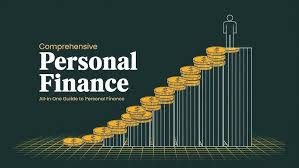Discover essential personal finance tips for beginners, including budgeting, saving, and investing. Learn how to take control of your money with simple, actionable steps!
Managing personal finances may seem overwhelming, especially if you’re just starting. However, learning how to budget, save, and invest wisely can significantly improve your financial well-being. This guide will help beginners navigate the fundamentals of personal finance, providing practical steps to make money management easier and more effective.
Why Personal Finance Matters
Understanding personal finance is crucial for achieving financial stability and security. By mastering budgeting, saving, and investing, you can:
- Reduce financial stress
- Build a safety net for emergencies
- Plan for long-term goals like buying a house or retiring comfortably
- Grow your wealth over time
Budgeting: The Foundation of Personal Finance
What Is Budgeting?
Budgeting is the process of planning your income and expenses to ensure you are living within your means. It helps you allocate your money effectively to essential expenses, savings, and discretionary spending.
How to Create a Budget
- Calculate Your Income: Determine your total monthly income, including salary, side hustles, and passive income.
- Track Your Expenses: Categorize your spending into fixed (rent, utilities) and variable (entertainment, dining out) expenses.
- Set Spending Limits: Allocate money for necessities, savings, and optional expenses.
- Use the 50/30/20 Rule:
- 50% for needs (housing, groceries, utilities)
- 30% for wants (entertainment, dining, shopping)
- 20% for savings and investments
- Adjust as Needed: Review your budget monthly and make necessary adjustments.
Saving: Building Financial Security
Importance of Saving
Saving money provides financial security and prepares you for emergencies, large purchases, and future investments. It also helps you avoid debt and achieve financial goals more efficiently.
Best Saving Strategies
- Pay Yourself First: Automatically transfer a portion of your income into savings before spending.
- Emergency Fund: Aim to save 3-6 months’ worth of living expenses in a high-yield savings account.
- Use Savings Accounts Wisely: Choose accounts with high interest rates and minimal fees.
- Cut Unnecessary Expenses: Identify non-essential spending habits and redirect that money into savings.
Investing: Growing Your Wealth
Why Invest?
Investing allows you to grow your wealth over time by putting your money into assets that appreciate in value. Unlike saving, investing generates returns that can outpace inflation, ensuring your money retains its purchasing power.
Types of Investments
- Stocks: Ownership in a company with potential for high returns but higher risk.
- Bonds: Loans to companies or governments with lower risk and steady income.
- Mutual Funds and ETFs: Diversified investments that pool money from multiple investors.
- Real Estate: Buying property for rental income or resale value appreciation.
- Retirement Accounts: 401(k)s and IRAs provide tax advantages for long-term investing.
How to Start Investing
- Educate Yourself: Learn about different investment options and risks.
- Set Clear Goals: Define short-term and long-term investment objectives.
- Start Small: Invest within your comfort level and gradually increase contributions.
- Diversify Your Portfolio: Spread investments across different assets to reduce risk.
- Monitor and Adjust: Regularly review your investments and make necessary changes.
Common Mistakes to Avoid in Personal Finance
- Living Beyond Your Means: Spending more than you earn leads to debt accumulation.
- Not Having an Emergency Fund: Without savings, unexpected expenses can cause financial hardship.
- Ignoring Retirement Savings: The earlier you start, the more you benefit from compound interest.
- Making Emotional Financial Decisions: Avoid panic selling or impulsive investments.
- Not Tracking Expenses: Without awareness of where your money goes, budgeting becomes ineffective.
Mastering personal finance is a journey that requires discipline and continuous learning. By budgeting effectively, saving strategically, and investing wisely, you can achieve financial stability and build wealth over time. Start small, stay consistent, and watch your financial future improve.
Frequently Asked Questions (FAQ)
1. How much should I save each month?
A general rule is to save at least 20% of your income, but this depends on your financial goals and obligations.
2. What’s the best budgeting method for beginners?
The 50/30/20 rule is a simple and effective method for budgeting, helping balance necessities, wants, and savings.
3. How can I start investing with little money?
Consider micro-investing apps, ETFs, and fractional shares, which allow you to invest small amounts regularly.
4. Should I pay off debt before saving?
It’s best to balance both. Prioritize high-interest debt while building a small emergency fund to avoid future borrowing.
5. What’s the safest investment for beginners?
Low-risk options like high-yield savings accounts, bonds, and diversified mutual funds are great for new investors.
By following these principles, you can take control of your financial future and make informed money decisions. Start today and set yourself on the path to financial success!
